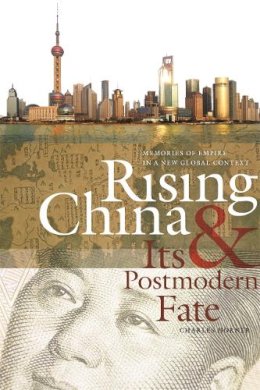
Rising China and Its Postmodern Fate: Memories of Empire in a New Global Context (Studies in Security and International Affairs)
Charles Horner
China's sense of today and its view of tomorrow are both rooted in the past—and we need to understand that connection, says China scholar Charles Horner. In Rising China and Its Postmodern Fate, Horner offers a new interpretation of how China's changed view of its modern historical experience has also changed China's understanding of its long intellectual and cultural tradition. Spirited reevaluations of history, strategy, commerce, and literature are cooperating—and competing—to define the future.
The capstone of modern China was the founding of the People's Republic in 1949 and its rejection of Confucianism, capitalism, and modernity. Yet today's rising China retains few vestiges of what Mao wrought. What then, Horner asks, is post-Mao, postmodern China? Where did it come from? How did it get here? Where is it going?
Contemporary views of the great periods in Chinese history are having a significant influence on the development of rising China's national strategy, says Horner. He looks at the revival of interest in, and changing interpretations of, three dynasties—the Yuan (1272-1368), the Ming (1368-1644), and the Qing (1644-1912)—that, together with the People's Republic of China, provide examples of great power success.
The future of every major country is now connected to China's, and this book explains how China, now seeing itself as the complex and thriving result of the old and the new, is poised to change the world.
Product Details
About Charles Horner
Reviews for Rising China and Its Postmodern Fate: Memories of Empire in a New Global Context (Studies in Security and International Affairs)
Jonathan Fenby
Asia Policy
This book connects China’s past, present, and future and places them in a larger, evolving context. Horner’s work is nothing short of a tour de force of world intellectual history as projected and contested on the canvas that is China.
Naval War College Review The book is clear, engagingly written, and quite original, combining an overview of Western scholarship, some Chinese scholarship, and a critique of twentieth-century Chinese culture to argue the prospects of China's completed modernization and the challenges it poses for the state and the military.
Pamela Kyle Crossley
Robert 1932 and Barbara Black, Professor of History, Dartmouth College
Rising China and its Postmodern Fate is a highly informed and insightful set of reflections on the question, what are we to make of the much-discussed 'rise' of China? Horner combines a wide-ranging specialist knowledge and an ability to look at the question from many angles in succession. This is a unique and marvelous piece of deep reflection on some of the most important issues of history of our time.
Arthur Waldron
Lauder Professor of International Relations, University of Pennsylvania
Horner looks to many different Chinas as they interact with various world systems. Rather than taking a narrow view of strategy, he sees the combination of the civil and the military as an ‘intellectually creative activity’ that appeals to the ‘strategic imagination’ of history, literature, art, architecture and urban planning. Rather than define the future in singular terms, Horner charts the complexities of China's many hopes, dreams, anxieties, and ambivalences.
William Callahan
Journal of Asian Studies
Horner reflects on China’s current rise, not as an anomaly, but as part of a long tradition of dramatic transformations. This book is thus an elegant warning against either dogmatic or essentializing interpretations of Rising China, or excessive certitude about its fate.
Peter Ditmanson
Oxford University
